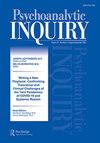Epilogue: New Psychoanalysts Speak – Reflections on Personal and Professional Transformations
IF 0.4
4区 心理学
Q3 PSYCHOLOGY, PSYCHOANALYSIS
引用次数: 0
Abstract
Hillman and Rosenblatt (2018) assembled a collection of essays from 12, established and well-known psychoanalysts, wherein contributors reflect years later on the process of their respective journeys to finding a true-to-self analytic voice and inner narrative. In particular, these analysts write about personal and life experiences that led them to discover their “own differentiated voice” and “raise the question of what kind of institution maximizes the potential for this kind of development” (p. 199). In contrast, the contributors to this issue of Psychoanalytic Inquiry are newly established or establishing and lesser-known psychoanalysts, who, also speak eloquently about their recent journeys each to finding a contemporary analytic voice grounded in lived experience. Several themes emerge from the narratives of these newly minted psychoanalysts. First, each contributor either explicitly or implicitly communicated that their training programs for the most part nourished their ongoing development as psychoanalysts and psychoanalytic thinkers. While some described disappointments with supervisors and others realized that their institute was not as sensitive as they thought it should or could be to issues of cultural and racial marginalization. Overall, as candidates they neither reported having to overcome exclusionary criteria (Holmes, 2018) nor enduring frankly abusive treatment by faculty in order to graduate (Rachman, 2021). Instead, these new analysts (Kathy Monroy, Debra Myers, Rochelle Broder, Ruth Migler, John Paddock, and Shirley Malove) write movingly about the warmth, support, and encouragement they received from their personal and training analysts, faculty, and colleagues – sometimes in the face of life-changing tragedy – to identify, nurture, embrace, and cherish their own analytic outlook and voice. Sandra Hershberg writes from the perspective of being a Director of Psychoanalytic Training to share her ideas about the process of becoming a psychoanalyst, implicitly referring to the kind of support training programs need to encourage and nourish each candidates’ unique developmental journey. Second, most authors describe experiences of being “different” or the “Other,” either explicitly or implicitly of having struggled to better understand lived and intergenerationally transmitted life events to become grounded in their own truths – as psychoanalysts and as human primates who, like the patients they see, seek empathically attuned, genuine, warm, and meaningful relational connection, connection that changes the life of both the analyst and patient (Slavin & Kriegman, 1998). These are analysts who seem to have embraced the relational turn in psychoanalysis. Additionally, hearing their unique stories of being othered and how their personal analysis alongside the accumulated power of psychoanalytic training (a course of study, supervision, and personal analyses) provided personal and professional transcendence and transformation is very much in keeping with the important socio-cultural turn in psychoanalysis. Third, all contributors discuss in one form or another of both having witnessed the struggles of significant others in their lives that antedated the decision to pursue psychoanalytic training (Hillman & Rosenblatt, 2018), and being with patients, what Eshel (2019) calls patient-analyst “withnessing” in intersubjective moments of relational connection, along with being present and still (Berzoff, 2019), holding (Slochower, 2014), and committed to mutual meaning-making (Aron, 1996). Consistent with observations reported by Hillman and Rosenblatt (2018), our contributors seem “gifted at understanding the needs of psychically wounded parents . . . [and/or to] the suffering of their community”结语:新精神分析家的演讲——对个人和职业转变的思考
Hillman和Rosenblatt(2018)收集了12位知名精神分析学家的文章集,其中的撰稿人在几年后反思了他们各自寻找真实自我分析声音和内心叙事的过程。特别是,这些分析人士写下了个人和生活经历,这些经历使他们发现了自己“不同的声音”,并“提出了一个问题,即什么样的制度最大限度地发挥了这种发展的潜力”(第199页)。相比之下,这期《精神分析探究》的撰稿人是新成立或成立的、鲜为人知的精神分析学家,他们也雄辩地讲述了他们最近的旅程,每个人都在生活经验中找到了当代分析的声音。这些新晋精神分析学家的叙述中出现了几个主题。首先,每个贡献者都明确或含蓄地表示,他们的培训计划在很大程度上滋养了他们作为精神分析学家和精神分析思想家的持续发展。一些人描述了对主管的失望,另一些人则意识到,他们的研究所对文化和种族边缘化问题并不像他们认为的那样敏感。总的来说,作为候选人,他们既没有报告必须克服排斥标准(Holmes,2018),也没有报告为了毕业而忍受教员的坦率虐待(Rachman,2021)。相反,这些新的分析师(Kathy Monroy、Debra Myers、Rochelle Broder、Ruth Migler、John Paddock和Shirley Malove)感人地写下了他们从个人和培训分析师、教员和同事那里得到的温暖、支持和鼓励——有时面对改变人生的悲剧——以识别、培养、拥抱和珍惜自己的分析观点和声音。Sandra Hershberg从心理分析培训总监的角度撰文,分享她对成为精神分析师过程的想法,含蓄地提到了鼓励和滋养每位候选人独特发展历程所需的支持培训计划。其次,大多数作者都描述了“不同”或“他者”的经历,无论是明确的还是隐含的,他们都在努力更好地理解生活和代际传递的生活事件,以建立在自己的真理基础上——作为精神分析学家和人类灵长类动物,他们和他们看到的病人一样,寻求同理心、真诚、温暖,以及有意义的关系联系,这种联系改变了分析师和患者的生活(Slavin&Kriegman,1998)。这些分析家似乎已经接受了精神分析中的关系转向。此外,听到他们独特的另类故事,以及他们的个人分析如何与精神分析训练(一门学习、监督和个人分析课程)积累的力量一起提供个人和职业的超越和转变,在很大程度上符合精神分析中重要的社会文化转变。第三,所有撰稿人都以这样或那样的形式讨论了在决定接受精神分析训练之前,他们目睹了重要他人在生活中的挣扎(Hillman&Rosenblatt,2018),以及与患者在一起,Eshel(2019)称之为患者分析师在关系连接的主体间时刻的“陪伴”,以及存在和静止(Berzoff,2019),持有(Slochower,2014),并致力于相互意义的创造(Aron,1996)。与Hillman和Rosenblatt(2018)报告的观察结果一致,我们的贡献者似乎“善于理解精神创伤父母的需求……[和/或]他们社区的痛苦”
本文章由计算机程序翻译,如有差异,请以英文原文为准。
求助全文
约1分钟内获得全文
求助全文
来源期刊

Psychoanalytic Inquiry
PSYCHOLOGY, PSYCHOANALYSIS-
CiteScore
1.00
自引率
33.30%
发文量
65
期刊介绍:
Now published five times a year, Psychoanalytic Inquiry (PI) retains distinction in the world of clinical publishing as a genuinely monographic journal. By dedicating each issue to a single topic, PI achieves a depth of coverage unique to the journal format; by virtue of the topical focus of each issue, it functions as a monograph series covering the most timely issues - theoretical, clinical, developmental , and institutional - before the field. Recent issues, focusing on Unconscious Communication, OCD, Movement and and Body Experience in Exploratory Therapy, Objct Relations, and Motivation, have found an appreciative readership among analysts, psychiatrists, clinical psychologists and a broad range of scholars in the humanities.
 求助内容:
求助内容: 应助结果提醒方式:
应助结果提醒方式:


